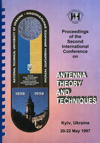Application of the computational electromagnetics methods for determining the radar characteristics of targets in the decametric wave band
DOI:
https://doi.org/10.1109/ICATT.1997.1235211Abstract
The problem of target scattering analysis is very important for radars. In becomes considerably complicated for the over-the-horizon radar where a number of additional factors stipulated by the effect of ionosphere, earth surface, etc. appear. The sum of these factors can change the radar characteristics of the target (RCT) sich as the elements of polarization scattering matrix (PSM). RCT determination is realized either by experiments or by a physical and mathematical simulation. Experiments and physical simulation require considerable material and time expenses and can be carried out as a rule under a number of limiting conditions. The mathematical simulation of RCT has no such disadvantage. But the main aim: a high reliability of results must be achieved in this case, that puts strict requirements on a choice of mathematical model.References
Computational Methods in Electromagnetic Theory. Moscow: Mir, 1977 [in Russian, ed. by R. Mittra].
Sazonov, D.M. Antennas and Microwave Devices. Moscow: Vysshaya Shkola, 1988 (in Russian).
Published
1997-05-24
Issue
Section
Analytical and numerical techniques

